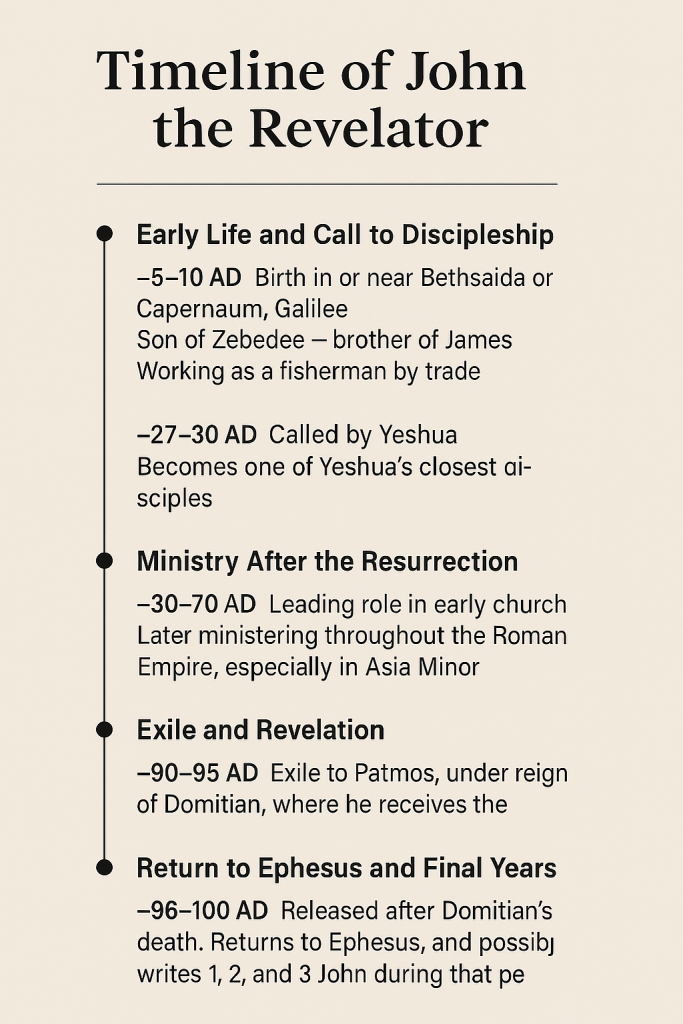“The Deathless Apostle? Unraveling the Mystery of John the Revelator”

Did John the Revelator Die—or Was He Taken Like Enoch?
Among the apostles of Yeshua, John stands alone—not just as “the disciple whom Yeshua loved,” but as the only one whose death remains shrouded in mystery. While others died martyrs’ deaths in fiery persecutions, John’s fate is the subject of centuries-long speculation, tradition, and controversy.
Was he boiled alive—yet lived?
Was he exiled to Patmos, only to return and die of old age?
Or was he, as some believe, translated—changed, and preserved until the return of the Messiah?
Let’s trace the tangled trail of this mystery.

Yeshua’s Puzzling Words: A Hint at Immortality?
The root of the controversy lies in an enigmatic statement made by Yeshua in John 21:22:
“If I will that he remain till I come, what is that to you? You follow Me.”
Peter had just asked what would become of John. Yeshua’s response was neither confirmation nor denial—but rather, a cryptic possibility. The early believers were so affected by this statement that a rumor spread that John would never die (John 21:23). Yet, Scripture quickly clarifies:
“Yeshua did not say to him that he would not die, but…”
Still, the question lingered. Why would Yeshua say such a thing if it wasn’t meant to stir deeper curiosity?
Foxe’s Account: A Miraculous Escape from Death
According to Foxe’s Book of Martyrs, John was:
- Thrown into boiling oil under Emperor Domitian—yet survived without injury.
- Exiled to Patmos, where he received the Revelation.
- Later returned to Ephesus, where he died peacefully.
This miraculous survival is unusual even among the apostles. Foxe reports it matter-of-factly, without embellishment—yet it reads like something straight out of Daniel’s furnace or a modern legend.
The LDS Perspective: The Apostle Who Never Died
In contrast, Latter-day Saint scripture (Doctrine & Covenants 7) claims John asked to tarry on earth until Yeshua’s return—and that his request was granted. According to this belief, John was translated, like Enoch or Elijah, and remains alive today, carrying out divine work unseen by the world.
Though not found in the canon of most Christian traditions, this interpretation fuels a fascinating theological possibility: an apostle still walking the earth, untouched by time.
The Traditional Christian View: A Peaceful Death
The early church historian Irenaeus (a disciple of Polycarp, who knew John personally) states that John:
- Lived to old age.
- Died peacefully in Ephesus under the reign of Emperor Trajan (98–117 AD).
His tomb in Ephesus was venerated by believers, and no early church fathers speak of John being translated or alive into the present day. To them, the mystery was settled—John lived long and died well.
The Hebrew Roots Perspective: Hold to the Word
From a Torah-respecting, Scripture-alone foundation, the question must be examined through the lens of what is written—not what is speculated.
- Yeshua’s words leave room for mystery, but not certainty.
- There is no direct scriptural statement that John was taken like Enoch or Elijah.
- Therefore, we cannot dogmatically say he was translated—but neither can we definitively close the door.
Sometimes, Yehovah allows mysteries to remain… to keep us watching.
Conclusion: A Mystery Worth Meditating On
In an age obsessed with certainty, John’s fate teaches us something deeper—that not everything Yehovah does is revealed at once. The beloved disciple may have died. Or he may still walk the earth, hidden in plain sight, until the King returns.
And perhaps that is exactly what Yeshua meant when He said:
“What is that to you? You follow Me.”










